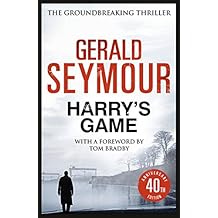Out of the 1970s came a series of what I call journalist thrillers, written with a considerable realism and usually by writers who’d been reporters. Perhaps the most famous example is Frederick Forsyth’s The Day of the Jackal. 
One of the very best is Gerald Seymour’s Harry’s Game, set mostly in Belfast during the Troubles of the mid 1970s, at a time when the warfare between the British Army, the security services and the IRA was at its height.
Gerald Seymour was a reporter on the streets of Belfast at the time and it shows.
To pull off this sort of gritty realism you really need to have walked those troubled streets and estates of Belfast – the Falls Road, the Shankill, the Ardoyne, the Ballymurphy… Seymour did and you can feel the gripping fear that beset these places at the time in every page of Harry’s Game – these aren’t experiences that can be faked. You need to have been there.
Interestingly, the violence level in Harry’s Game is not over-excessive. Characters are beaten and shot but it never goes beyond that. Harry’s Game is not as graphically violent as many a more modern thriller.
Gerald Seymour achieves menace by the tenseness of the writing, the dangers of men having to live double lives in hostile environments. Undercover work is rarely as well presented as here.
Harry’s Game begins with the assassination of a British cabinet minister by an IRA gunman, Billy Downes, who after the shooting returns to his home in Belfast. On the direct orders of the Prime Minister, and without telling the army or most of the security services, a section of British Intelligence decides to place an agent in Belfast to discover the identity of the assassin.
They use Harry Brown, an army captain of Irish ancestry, who’s previously lived undercover in the Middle East and had a subsequent breakdown. Harry moves into a boarding house off the Falls Road, posing as a merchant seaman with republican sympathies.
Meanwhile Billy Downes tries to sink back into his former life with his wife and children, though brought out at one point to kill a soldier.
There is a kind of parallel between Harry Brown and Billy Downes. Both work undercover for their respective armies. Both are fearful of discovery. Both are under enormous pressure as the people hunting them down get ever closer. Both are victims of a tragic conflict and are neither good nor bad in themselves.
This very well-crafted book was Gerald Seymour’s first novel, though it doesn’t come over as anything but skilled. For sheer suspense it’s hard to beat. I think it captures Belfast very well at that moment in time. Reading it again, now, and remembering those days, it’s all the more remarkable that, politically, Northern Ireland has moved on so much.
The book’s tragic ending still has the power to shock.
